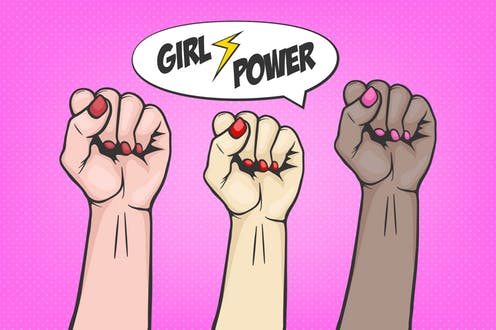False perceptions about feminism impacts student’s voices

CAUSING CHANGE: Many celebrities and world leaders have stepped up to bring attention to the feminist movement.
One of the major topics in the current political climate is equality. Feminism groups are rising and working hard to try and decrease the gap between women and men. Women across the country are bravely telling their stories, starting powerful organizations, like the Me Too movement.
However, with this attention and change comes challenges. Recently, there has been a negative connotation surrounding feminists and feminism in general, which can sometimes carry into student’s everyday lives.
“I do think there is a negative connotation surrounding feminism, especially with people who are a little less educated on the topic,” said Freshman Julia Kushner. “People will think feminism is women over men when the definition is basically equality.”
Many women agree the main problem is a lack of education. Men and women often have mixed definitions of feminism, which can lead to this negative connotation.
“I have heard people talk about how feminism is trying to make women superior and that women are already treated equally to men, which is proven untrue,” said Junior Jordan Tucker. “I think people that are uneducated on the issue and do not have a personal attachment don’t understand the importance of the feminist movement.”
These thoughts sometimes result in women refraining from speaking up for what they believe in. This can range from a meeting in a workplace to talking in the classroom.
“I feel like a lot of people see feminists as really mean, and people know I’m a feminist so people automatically think I’m mean or harsh,” freshman Grace Porges said. “Part of the reason why I don’t speak out more is because I’m afraid I’ll get judged. Even when I put stuff on my Instagram, people will comment and come back at me.”
Almost daily, instances, like microaggressions or direct comments, can make women feel less than men. These acts frequently take place in sports, like soccer and basketball. Many women describe a border that can be felt during scrimmages and games.
“The boys didn’t treat me the same,” said Porges. “During soccer, when I would scrimmage against guys, they would poke me a little bit and be like ‘oh my god are you ok.’I wanted to say, ‘I can play rough too. I’m fine. I’m not fragile.’”
Kushner agrees that there is often a feeling of discomfort in certain instances.
“I haven’t specifically been discriminated against because of my gender, but because I’m a girl I do think I have been perceived as lesser than,” said Kushner. “I’m not as smart. I’m not as athletic. I can’t do certain things.”
The rise of the feminist movements also provides an outlet for women to voice their feelings about issues they encounter revolving their gender. Role models like Michelle Obama and Meghan Markle provide powerful and encouraging words towards young women. Annual women’s marches allow women to gather with people that share their beliefs.
“I do keep up with the news that involves feminism, like the Me Too movement. I like that women are getting a chance to speak out with their feelings,” Porges said. “Before Harvey Weinstein, a lot of women were holding back and now more and more women are coming out. I think it’s great. We all build each other up.”
With numerous women speaking up and encouraging others to do the same, young girls are being inspired from an early age. Women are rising up to the challenge to fight for equality.
“I would definitely consider myself a feminist,” Kushner said. “I’ve always had a passion for equality and especially when something impacts me on a personal level so greatly I definitely want to make a change.”

Samantha enjoys soccer and violin, and is especially interested in science-related topics. She loves writing and is excited to be on Nexus.






